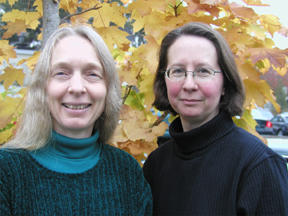Leigh Feisthammel wants to invite cancer patients and their friends and family to her abode.
The home she has in mind will combine features of a retreat, a spa and a meditation center.
Dubbed Humble Abode, the center will be located in Poulsbo, to serve the emotional and spiritual needs of Kitsap residents living with cancer and those who love and care for them.
Organizers hope to select a location in December, and open this coming spring.
Clustering services tailored to the needs of cancer patients is a new model of compassionate care, one that helped Feisthammel through the terminal illness of her father.
“People don’t realize how caregivers burn out,” she said. “Going to a place where everyone understood what was happening to me was very healing.”
Feisthammel was still adjusting to a 1999 move from the Pacific Northwest to North Carolina, where her husband had been transferred, when her father was diagnosed with pancreatic cancer.
Duke Medical Center in Durham, N.C., where he received treatments, referred her to Cornucopia House in Chapel Hill.
There, her family found support during the difficult time with therapies ranging from massage and yoga to counseling – for no fee.
“It was an incredible gift,” Feisthammel said. “I was still in grief from leaving the Northwest. I had no support system in place. If they hadn’t been there, I would have just been holed up in my house.”
At Cornucopia House, care extended even beyond immediate families to cancer caregivers and even friends of cancer patients.
But Feisthammel says she was most inspired by her encounters with the cancer patients she met.
“They listened to me and talked to me, and yet they were the patients themselves,” she said. “They were incredibly compassionate and empathetic.”
As she used the facility’s library to research her father’s condition, Feisthammel learned such facilities were relatively rare.
Most cancer patients had little support. And most caregivers were married women like Feisthammel herself, who were stressed and often overwhelmed by the role.
But a 1989 study in “Lancet,” a leading British medical journal, showed that social and psychological support doubled the length of survival for even the sickest patients. Other studies backed up those conclusions data.
In 2000, the family moved back to the Pacific Northwest. Among the people Feisthammel met as she settled on Bainbridge were some living with cancer. Yet she found there was no support facility like Cornucopia in West Puget Sound, and only two in Seattle.
The next step seemed obvious, but she made the commitment to establish a regional center with some qualms.
“I was well aware of the work it would take, and at first I thought, ‘I don’t have time for this,’” she said. “But there were just too many signs that it needed to happen here.”
Feisthammel is suited to the task by years in social services. In the early 1980s, she helped coordinate an early-release program for the Indiana prison system. She has been an interpreter for the deaf, and an advocate for abused deaf women.
To develop the Humble Abode cancer care center, Feisthammel teamed with islander Mickey Gibson, who will become the center’s program director. They incorporated Haven Cancer Resource as a nonprofit foundation, and are now raising funds.
Humble Abode will offer free services including family and individual counseling; workshops on such topics as self-hypnosis for pain management and improving communication with doctors; and a research library.
“Many sick people just can’t do it,” Feisthammel said. “We’ll have the resources so that family and friends can do it.”
Another important feature of the center, Gibson says, will be specialized support groups for people living with particular cancers.
“If you have breast cancer, the last thing you want to do is be in a group of, for example, men with another kind of cancer,” she said.
Other specialized groups might include children of cancer patients, long-term cancer survivors, and those with metastatic cancer.
What Humble Abode will not provide, Feisthammel says, is medical advice or services.
“People don’t need to be in another clinical setting, because they’re dealing with hospitals all the time,” Gibson said. “The location and atmosphere will be spiritually healing and restorative.”
For more information about Humble Abode, contact Haven Cancer Resource, P.O. Box 974, Poulsbo, WA 98370.


